|
|
|
Sort Order |
|
|
|
Items / Page
|
|
|
|
|
|
|
| Srl | Item |
| 1 |
ID:
117915
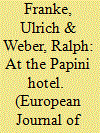

|
|
|
|
|
| Publication |
2012.
|
| Summary/Abstract |
Pragmatism is ever more popular amongst those who study international relations. Its emphasis on practice is generally acknowledged as a defining characteristic. There is, however, a general tension within pragmatist thought concerning practice, for pragmatism may emphasize the theorizing of practice. It is, then, distinguished from other theories in International Relations (IR) such as neo-realism or constructivism as a contender in their midst. We delineate a pragmatist theory of IR in the first part of this article, but insist on going beyond merely establishing the next paradigm, for pragmatism may also emphasize the practice of theorizing. Theories are, then, considered different tools useful for dealing with the social world. This will be corroborated in the second part by a close reading of William James. Finally, we submit that instead of a paradigm war, a metaphor such as that of the Papini hotel is needed in IR - a metaphor that accounts for theory competition without neglecting the limitations set by the practice of theorizing itself.
|
|
|
|
|
|
|
|
|
|
|
|
|
|
|
|
| 2 |
ID:
073986
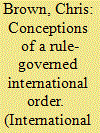

|
|
|
|
|
| Publication |
2006.
|
| Summary/Abstract |
Differences between American and European conceptions of a rule-governed international order can be observed via an examination of the legal regimes governing the conduct of American and British troops in Iraq. In principle, the US military authorities recognise the authority of international humanitarian law with respect to, for example, the treatment of prisoners and the distinction between combatants and non-combatants, but in other respects they are able to prosecute the war against the insurgency in a conventional way. British troops, on the other hand, are obliged to act in accordance with a much more restrictive legal regime, based on changes introduced subsequent to Britain's membership of the International Criminal Court. Under this regime, British military forces in Basra are subject to much the same kind of rules concerning the use of force that govern the operation of civilian police forces in Western Europe. This 'European' attempt to control the way in which force is used is widely seen as a positive move in the direction of minimising the role of force in international relations - but such a judgement is questionable since there may well be circumstances where the effective use of force is both necessary and justified.
|
|
|
|
|
|
|
|
|
|
|
|
|
|
|
|
| 3 |
ID:
101261


|
|
|
| 4 |
ID:
193296
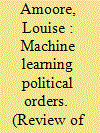

|
|
|
|
|
| Summary/Abstract |
A significant set of epistemic and political transformations are taking place as states and societies begin to understand themselves and their problems through the paradigm of deep neural network algorithms. A machine learning political order does not merely change the political technologies of governance, but is itself a reordering of politics, of what the political can be. When algorithmic systems reduce the pluridimensionality of politics to the output of a model, they simultaneously foreclose the potential for other political claims to be made and alternative political projects to be built. More than this foreclosure, a machine learning political order actively profits and learns from the fracturing of communities and the destabilising of democratic rights. The transformation from rules-based algorithms to deep learning models has paralleled the undoing of rules-based social and international orders – from the use of machine learning in the campaigns of the UK EU referendum, to the trialling of algorithmic immigration and welfare systems, and the use of deep learning in the COVID-19 pandemic – with political problems becoming reconfigured as machine learning problems. Machine learning political orders decouple their attributes, features and clusters from underlying social values, no longer tethered to notions of good governance or a good society, but searching instead for the optimal function of abstract representations of data.
|
|
|
|
|
|
|
|
|
|
|
|
|
|
|
|
| 5 |
ID:
073984


|
|
|
|
|
| Publication |
2006.
|
| Summary/Abstract |
This article examines the interpretation of rules as an essential part of their meaning. It starts with some of the most foundational rules - pacta sunt servanda, for instance - and points to their contested nature. It looks at some of the causes of this inherent contestability and its effects on the international system. It concludes by noting that appeals to rules never settle a debate, but only begin the interpretative process that constitutes the international system. While this interpretative licence does not lead to complete anarchy, it does leave open a wide range of outcomes in rule-governed systems.
|
|
|
|
|
|
|
|
|
|
|
|
|
|
|
|
| 6 |
ID:
181929
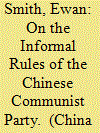

|
|
|
|
|
| Summary/Abstract |
The Chinese Communist Party (CCP) is a closely constituted party. Recent studies of the CCP describe and evaluate its formal rules, but to understand the Party as an institution we also need to understand its informal rules. The literature on “party norms”, “institutionalization” and the “unwritten constitution” often fails to distinguish rules from other political phenomena. It confuses informal rules with political practices, constitutional conventions, behavioural equilibria and doctrinal discourse. It is prone to overlook important rules, and to see rules where there are none. Hence, it potentially overstates how institutionalized the CCP is, and therefore how resilient it is. The article provides a clearer account of informal rules and suggests a different explanation for the resilience of the CCP.
|
|
|
|
|
|
|
|
|
|
|
|
|
|
|
|
| 7 |
ID:
166750
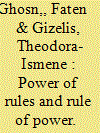

|
|
|
|
|
| Summary/Abstract |
The 2018 Presidential Theme for the International Studies Association’s Annual Conference was “Power of Rules and Rule of Power.” The theme underlines the importance of recognizing the relative and relational influence of power and rules in international politics. To do so, research should examine official rules but also probe what role informal rules play in shaping formal regulations of international interactions and power dynamics. The nexus of actors, issues, and interactions define international relations as a research field but also impact international studies as a profession. The articles included in this special issue and the forum expand, question, and problematize such interactions.
|
|
|
|
|
|
|
|
|
|
|
|
|
|
|
|
| 8 |
ID:
097448


|
|
|
| 9 |
ID:
073983
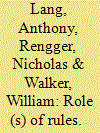

|
|
|
|
|
| Publication |
2006.
|
| Summary/Abstract |
This article explores the various roles that rules play in international relations. The article responds to the current international situation in which rules are being contested by numerous agents in a range of issue areas. While rules, by their very nature, will result in conflicting interpretations in social and political realms, these disagreements at the international level have the added danger of undermining international order. The article explores the nature of rules, focusing on moral and legal dimensions as they operate at the international level. We then turn to an exploration of debates about legitimacy, the impact of technology on rules and rule-making, and the dilemmas of enforcement. We conclude that while rules are a necessary part of any just political order, the dilemmas generated at the global level necessitate careful consideration of the very nature of rules. The responses to the article that follow this one seek to explore some of these issues and their relevance to more specific international issues.
|
|
|
|
|
|
|
|
|
|
|
|
|
|
|
|
| 10 |
ID:
145708


|
|
|
|
|
| Summary/Abstract |
This article advances a unified explanation of intersubjective rules, international agents, and historical structures. It also ties in national identity narratives and international practices. It shows that rules, suitably defined, instantiate and assemble themselves to form national-autobiographical narratives that become the identities of states, motivating their actions and practices. Agents here do not follow rules, rather self-activating rules constitute agents. Rules are distributed across states and other agents, some shared widely and others held narrowly. A rule can gain or lose credibility among the agents it constitutes. Rules depend on the operation of other agents’ rules for their credibility. An international historical structure is a collection of rules distributed among different states that operate to vindicate each other. The rules, shared and divided across agents, motivate practices that vindicate the rules. This process of structuration gives rise to enduring social networks of agents connected by interdependent practices. This process also yields the historical dynamics of the rise, fall, and succession of structures. Structures rise, unevenly, as new rules and practices join into the reproduction process and some old ones drop out. Structures break down when some rules are discredited, leading to a disruption of established practices, causing the discredit of yet more rules. Agents can be transformed radically. This model has strong empirical reference as the rules define categories, norms, and causal beliefs visible in discourse. The case of US-Russian relations is used for illustration.
|
|
|
|
|
|
|
|
|
|
|
|
|
|
|
|
| 11 |
ID:
114033
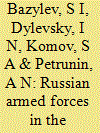

|
|
|
|
|
| Publication |
2012.
|
| Summary/Abstract |
The authors draw on the record of modern-day armed conflicts and practices followed in operational training of troops and staffs to come up with a system of principles and rules guiding the Russian Armed Forces' behavior in cyberspace operations and confidence-building measures that, they believe, could maximize the opportunities offered by the global information environment for reinforcing the country's defense capabilities, containing and preventing military conflicts, promoting cooperation in the military field, and developing an international information security system.
|
|
|
|
|
|
|
|
|
|
|
|
|
|
|
|
| 12 |
ID:
142622


|
|
|
|
|
| Summary/Abstract |
The article looks at Uzbekistan's political economy from the perspective of a logic of appropriateness, an approach that takes rules to be the underlying principle of action. The rules are mostly in line with a ‘spirit’ of self-reliance (mustaqillik), which has shaped Tashkent's international engagement since independence. From the perspective of those rules, the article reveals some important features of Russian–Uzbek relations, particularly the difficult and often tense negotiations over the future of the Tashkent Aviation Production Association (TAPOich). Self-reliance and the rules by which it was comprised were not, in the end, conducive to long-term cooperation with Russia in the aviation sector, where collaboration was first and foremost necessary.
|
|
|
|
|
|
|
|
|
|
|
|
|
|
|
|
|
|
|
|
|